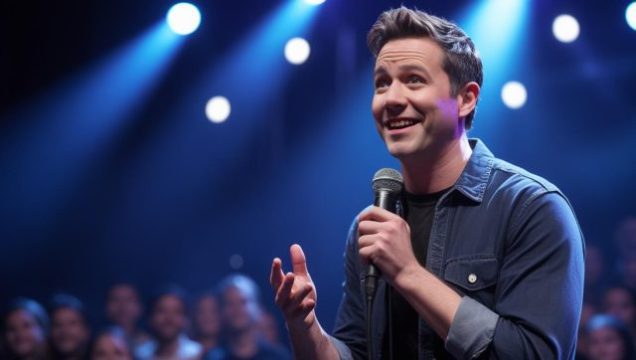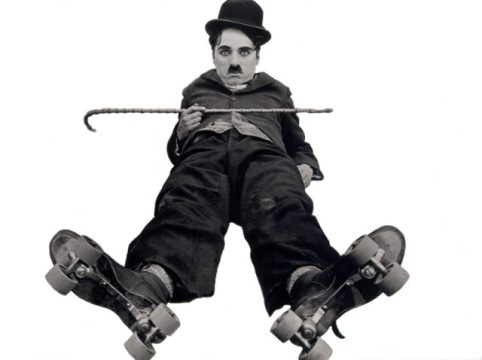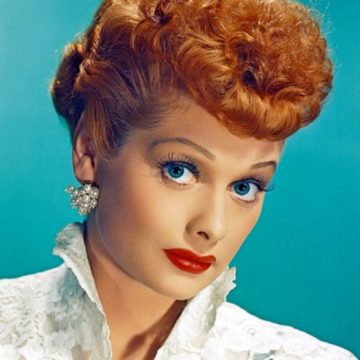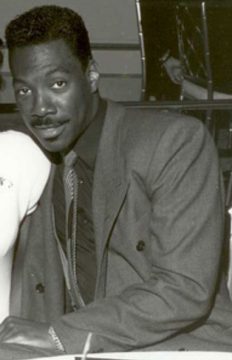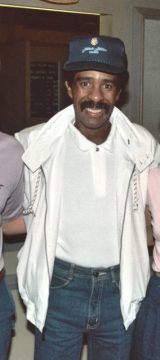Trying to name the single funniest person ever is like trying to pick the best song or the greatest movie — it’s impossible. Comedy is deeply personal, shaped by your experiences, your culture, and what makes you laugh. What splits sides for one person might barely earn a smirk from another. And that’s the beauty of humor.
That said, while we can’t crown just one king or queen of comedy, we can recognize those rare individuals who changed the game entirely. The comedians on this list aren’t just funny — they’re trailblazers, innovators, and icons. We looked beyond quick laughs and viral moments to spotlight the comedy legends who left a lasting impact. These are the ones who inspired generations, revolutionized stand-up, transformed television, and redefined what it means to be funny.
So what makes a comedy legend? It’s a mix of timeless influence, signature style, cultural impact, and the ability to connect deeply through humor. Whether they starred in sketch shows, created unforgettable stand-up specials, or shaped comedy from behind the scenes, these ten performers have earned their place in history.
This article counts down 10 of the greatest comedy legends of all time — the people whose work continues to bring laughter to millions and whose legacies paved the way for today’s stars. Ready to see who made the list?
Let the laughter begin.
10. Gilda Radner: The Heart and Soul of Early Saturday Night Live
Why is Gilda Radner considered a comedy legend?
Gilda Radner earned her spot in comedy history as one of the most successful “Saturday Night Live” cast members ever, blazing a trail as an original performer in the groundbreaking show’s first season. Her magnetic presence, unmatched character work, and fearless humor made her an icon of sketch comedy and a beloved figure in American entertainment.
Why Gilda Radner’s Characters Remain Comedy Gold
From Roseanne Roseannadanna to Emily Litella, Radner’s characters were as quirky as they were timeless. She had a genius for transforming everyday absurdities into unforgettable performances, blending physical comedy with brilliant wit. A staple of the comedy club scene before hitting it big, Radner brought a theatrical energy to every skit, often stealing scenes with her wide-eyed expressions and lovable weirdness.
“It’s always something.” — Roseanne Roseannadanna, Gilda’s most famous line, still quoted by comedy fans today.
Her performances weren’t just funny — they were emotionally rich, often rooted in a deep understanding of human vulnerability. That ability to find truth inside comedy made her work feel incredibly real.
The Enduring Legacy of a Fearless Female Comedian
Gilda Radner shattered glass ceilings in a male-dominated comedy world, proving that women could be just as wild, silly, and daring on stage. Her fearless character-driven comedy inspired generations of female performers, from Tina Fey to Maya Rudolph. Through her humor and honesty, she also brought public awareness to cancer and the human side of struggle, founding Gilda’s Club, a support organization for people with cancer.
Even decades after her passing, Gilda’s influence is alive in every SNL sketch, every bold female comic, and every fan who learned to laugh through life’s chaos. She didn’t just make people laugh, she gave them permission to be themselves.
9. Dave Chappelle: The Unflinching Voice of Modern Stand-Up
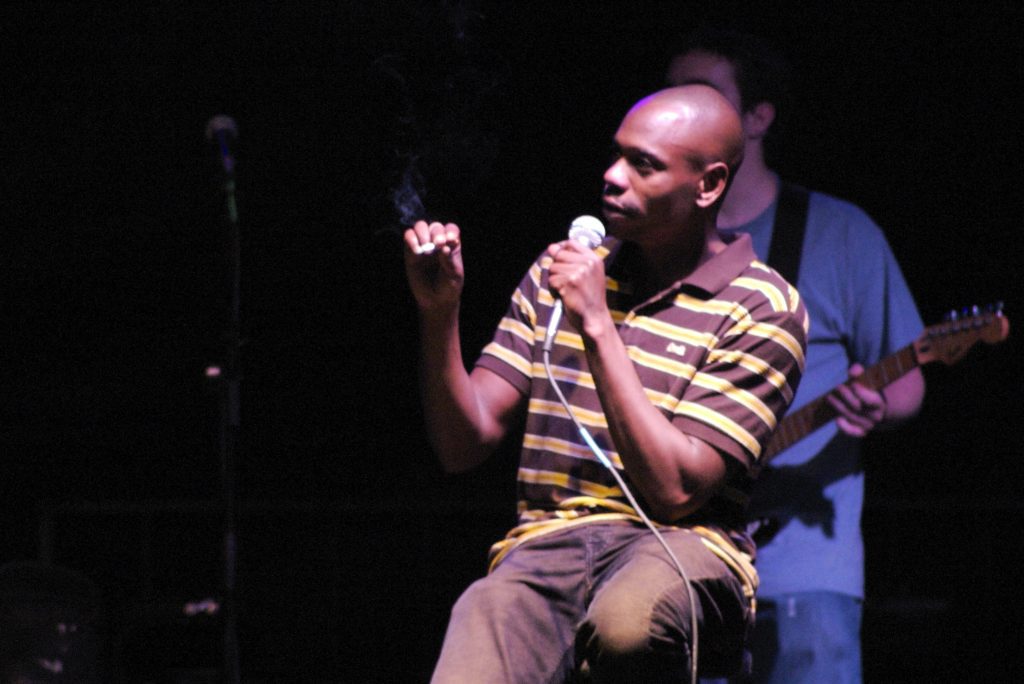
From Chappelle’s Show to Netflix: A Comedy Evolution
Dave Chappelle is widely regarded as one of the sharpest comedic minds of his generation, and for good reason. From his breakout success on Chappelle’s Show to his game-changing comeback via Netflix specials, Chappelle has continually redefined what modern comedy can be. He took sketch humor to new heights, earning his place among the legends of sketch comedy and variety shows, then pivoted seamlessly into thought-provoking, arena-packing standup.
With Chappelle’s Show, he gave us viral gold long before social media made it easy — unforgettable sketches like “Charlie Murphy’s True Hollywood Stories” and “Rick James” remain cultural touchstones. Then, after walking away from fame at its peak, he returned years later with a quieter, more mature voice — but still with that trademark edge and insight.
“The hardest thing to do is to be true to yourself, especially when everybody is watching.” — Dave Chappelle
Analyzing the Genius of Dave Chappelle’s Storytelling
What makes Chappelle stand apart is his gift for storytelling. His standup is often more like a masterclass in narrative, weaving together politics, race, personal pain, and raw honesty into something that’s not just funny, but deeply human. He knows exactly when to hit a punchline and when to let a silence linger, commanding attention like few others can.
His comedy isn’t afraid to ask uncomfortable questions. That’s part of the genius, he doesn’t just go for the laugh; he aims for the truth underneath it. That ability to balance humor and gravity has earned him Emmy Awards, Grammy wins, and a devoted fan base that spans generations.
The Enduring Legacy of a Cultural Provocateur
Dave Chappelle didn’t just tell jokes — he changed the conversation. From race relations to cancel culture, his work consistently challenges norms while staying rooted in sharp observational humor. Younger comedians cite him not just as an influence, but as a benchmark of authenticity.
Whether he’s performing intimate shows in small comedy clubs or headlining global tours, Chappelle remains fearless, funny, and absolutely essential. He’s not just one of the greatest, he’s a living legend still writing his story.
8. Carol Burnett: The Undisputed Queen of Sketch Comedy
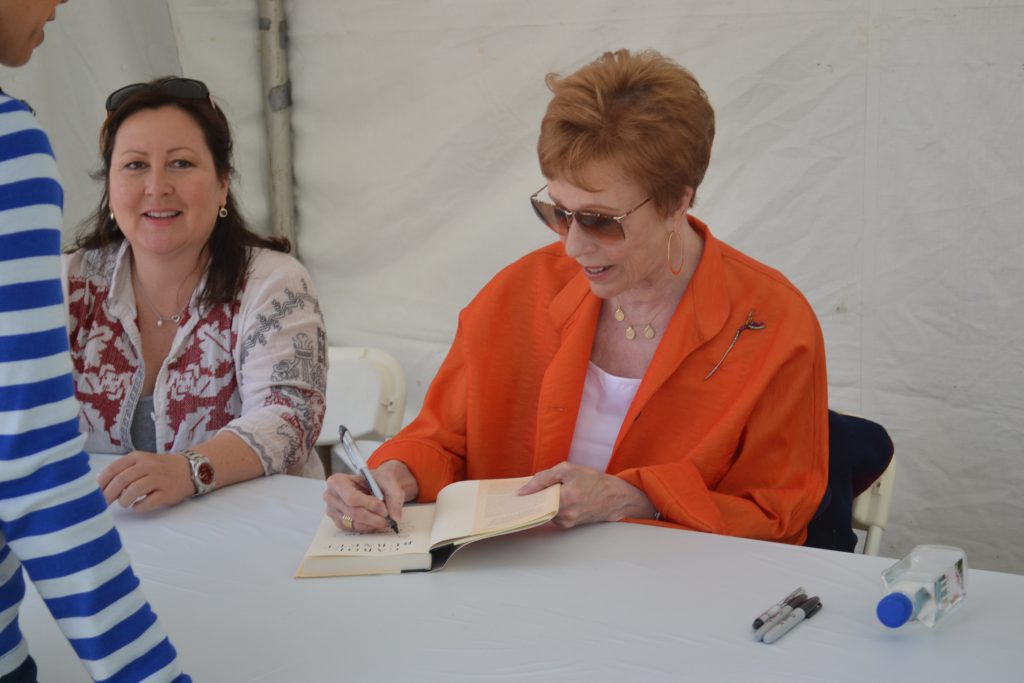
The Carol Burnett Show: A Masterclass in Variety Television
Carol Burnett redefined what variety television could be with The Carol Burnett Show, a groundbreaking series that remains a shining example of the best sketch comedy ever produced. With her warm charisma and razor-sharp timing, Burnett invited millions into her world each week, effortlessly mixing slapstick, satire, musical numbers, and heartfelt moments.
Premiering in 1967, The Carol Burnett Show ran for 11 seasons, collecting 25 Emmy Awards and a permanent place in television history. Alongside a brilliant ensemble cast including Tim Conway and Harvey Korman, Burnett created unforgettable characters like Eunice, Mrs. Wiggins, and Starlet O’Hara in her curtain rod dress. The show’s influence is still visible today in everything from Saturday Night Live to Key & Peele.
“I’m so glad we had this time together…” — Carol Burnett’s signature sign-off that still brings smiles and tears.
How Carol Burnett’s Physical Comedy Influenced Generations
Burnett wasn’t just a great performer. She was a master of physical comedy, capable of getting a laugh with a glance, a pratfall, or a single raised eyebrow. Her comedic range made it look easy, but she brought a theatrical discipline to every skit, combining vulnerability and goofiness in a way that felt uniquely real.
Her influence reaches far beyond her own show. Comedians like Kristen Wiig, Tina Fey, and Catherine O’Hara all cite Burnett as a guiding force in their careers. Her ability to commit fully to the bit, whether she was playing a hapless secretary or an out-of-touch diva, set the standard for what female comedians could do.
Carol Burnett proved that being funny didn’t mean being perfect — it meant being fearlessly human, and the world loved her for it.
7. Charlie Chaplin: The Silent Film Icon Who Made the World Laugh
The Tramp: How Chaplin Created a Universal Comedy Character
Charlie Chaplin is one of the best for silent comedy and undoubtedly one of the funniest British comedians who became world famous. His creation of The Tramp — a bowler-hatted, mustachioed vagabond with a heart of gold became the most iconic figure in early cinema. With no dialogue needed, Chaplin captured the entire emotional range of the human experience, from gut-busting laughs to quiet heartbreak.
His classics like City Lights, Modern Times, and The Gold Rush didn’t just entertain; they told powerful stories with social commentary that still hits home. The Tramp walked with a funny little shuffle, carried a cane, and wore oversized shoes — and yet somehow, he expressed more than most actors could with a page of dialogue.
The Timeless Appeal of Charlie Chaplin’s Physical Humor
Chaplin’s genius lay in physical comedy that was both inventive and emotionally intelligent. He could turn a simple bread roll into a dancing puppet or create hilarious chaos in a factory assembly line. Every movement was precise, every gag carefully crafted, and every emotion perfectly timed.
What made it magical was how he combined humor with empathy. Chaplin’s comedy wasn’t just about laughs; it was about connecting with audiences across languages, cultures, and generations. That’s why his work remains timeless.
Modern comedians — from Rowan Atkinson to Jim Carrey — have cited Chaplin’s influence. His legacy proves that when comedy is rooted in humanity, it never goes out of style.
Charlie Chaplin didn’t just star in silent films. He gave them a voice — one full of laughter, resilience, and heart.
“A day without laughter is a day wasted.” — Charlie Chaplin
6. Lucille Ball: The Trailblazing Genius Behind “I Love Lucy”
Few funny comedians have had the cultural impact of Lucille Ball. She wasn’t just a sitcom star, she was a comedic force who helped build the foundation of modern television. From her slapstick brilliance on screen to her sharp business instincts behind the scenes, Lucille Ball shaped comedy as we know it.
How Did Lucille Ball Revolutionize the Television Sitcom?
When I Love Lucy hit the airwaves in 1951, it didn’t just break ratings records — it changed the game. Lucille Ball’s portrayal of Lucy Ricardo, a lovable schemer with big dreams and no shortage of misadventures, became one of the most recognizable characters in television history.
- Her impeccable timing, exaggerated expressions, and physical comedy turned everyday chaos into comedic gold.
- Classic moments like the chocolate factory scene and the vitameatavegamin commercial are still studied by comedians today.
Lucille Ball proved that women could be hilarious leads — not just sidekicks. In an era where few women were allowed to be openly silly, she owned every laugh and created a blueprint for generations of sitcom stars to follow.
Beyond Lucy: The Business Acumen of a Comedy Legend
Lucille Ball didn’t stop at performing. As co-founder of Desilu Productions, she became one of the first women in Hollywood to run a major television studio. Under her leadership, Desilu greenlit iconic shows like:
- Star Trek
- Mission: Impossible
- And, of course, continued success for The Lucy Show and Here’s Lucy
Her savvy business moves and eye for talent made her a trailblazer in both comedy and television production. She wasn’t just funny, she was powerful, smart, and determined to create space for herself and others.
“I’m not funny. What I am is brave.” — Lucille Ball
That bravery is exactly why her legacy endures. Lucille Ball didn’t just make people laugh. She showed that women could lead, produce, and transform the world of comedy — all while being unapologetically themselves.
5. Joan Rivers: The Unapologetic Pioneer of Women in Comedy
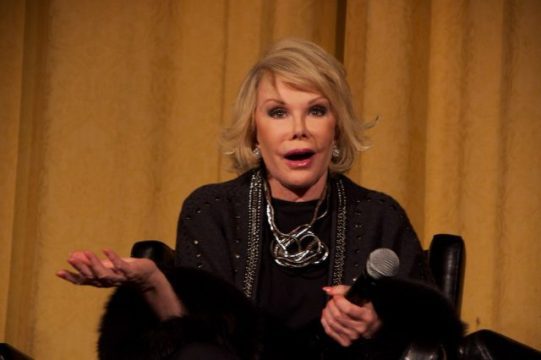
If comedy had a sharp edge and a diamond-studded mic, Joan Rivers was holding it. Unfiltered, unrelenting, and undeniably hilarious, she earned her place as one of the greatest female comedians in history. She didn’t just break down doors for women in stand-up, she kicked them off the hinges in heels.
The Legacy of Joan Rivers for Women in Comedy
Joan Rivers was one of the first women to rise to true stardom in stand-up, and she did it by refusing to play nice. Her brand of comedy wasn’t soft or sweet, it was raw, cutting, and totally unapologetic. That made her a hero to generations of women who saw her not just as a comic, but as a symbol of permission: to be loud, to be angry, to be funny, and to be heard.
She paved the way for names like Sarah Silverman, Amy Schumer, and Chelsea Handler, proving that women could absolutely dominate the comedy circuit and deliver funny jokes for adults that pulled no punches.
“Can We Talk?”: The Sharp, Fearless Wit of Joan Rivers
Her signature line, “Can we talk?”, became shorthand for brutal honesty. No subject was off limits — from celebrity plastic surgery to her own struggles with aging, marriage, and motherhood, Joan laid it all out with unmatched timing and precision.
She was a master of insult comedy, delivering zingers that stung and made you laugh at the same time. Her wit was fast, fearless, and loaded with truth. Whether she was roasting Hollywood elites or herself, her jokes hit hard and always left you wanting more.
“I succeeded by saying what everyone else is thinking.”
From Stand-Up to Red Carpet: The Unstoppable Career of Joan Rivers
Joan’s career spanned over five decades, and she refused to slow down. From stand-up specials and bestselling books to hosting Fashion Police and revolutionizing the red carpet with her acerbic commentary, she stayed relevant and in-demand right until the very end.
She was also the first woman to host a late-night talk show, proving she could hold her own in what was then a boys’ club. Through triumph and tragedy, comebacks and controversy, Joan Rivers never stopped hustling or making people laugh.
Joan didn’t just tell jokes — she owned the room, owned her voice, and made damn sure no one forgot her name.
4. Eddie Murphy: The Charismatic Force That Dominated 80s Comedy
Eddie Murphy didn’t just step onto the comedy scene—he exploded onto it. With swagger, energy, and razor-sharp wit, he became a megastar almost overnight. Whether rocking red leather on stage or impersonating Mr. Rogers on national TV, Murphy quickly became one of the comedians who had the best TV specials and left an unforgettable mark on stand-up, sketch, and film.
Delirious & Raw: How Eddie Murphy Redefined Stand-Up
In the 1980s, Delirious and Raw weren’t just comedy specials—they were cultural milestones. Eddie Murphy hit the stage like a rock star, delivering stand-up that was edgy, outrageous, and wildly original.
- His confidence was unmatched.
- Impersonations were flawless.
- His material pushed boundaries with a boldness few dared to try.
These specials redefined what stand-up could be. They were raw in name and in spirit, tackling topics from family to fame with humor that was both brutal and brilliant. Murphy’s charisma made it all feel effortless, and audiences couldn’t get enough.
Even today, comedians still cite those specials as required viewing. They weren’t just funny, they were genre-defining.
The Lasting Impact of Eddie Murphy’s SNL Characters
When Eddie Murphy joined Saturday Night Live in the early 80s, the show was struggling. Within weeks, he became the lifeline it desperately needed.
And he didn’t just appear—he dominated.
Characters like:
- Buckwheat (“Otay!”)
- Mr. Robinson (a twisted take on Mr. Rogers)
- Gumby (“I’m Gumby, dammit!”)
Became instant classics.
His energy was electric. He could take a mediocre sketch and elevate it to unforgettable with one look, one voice, one smirk. By the time he left SNL, Eddie Murphy had transformed the show and helped save it from cancellation.
His work on SNL wasn’t just funny—it was explosively innovative, and it set the bar for future cast members. Many say he was the first true superstar to come out of the show.
From stand-up arenas to movie blockbusters, Eddie Murphy became one of the biggest comedy stars in the world and he did it on his own terms. He was cool, confident, and completely in control of the room.
Eddie didn’t just make people laugh. He made comedy feel like the hottest thing on the planet.
3. Robin Williams: A Look at the Man of Improv and Heart
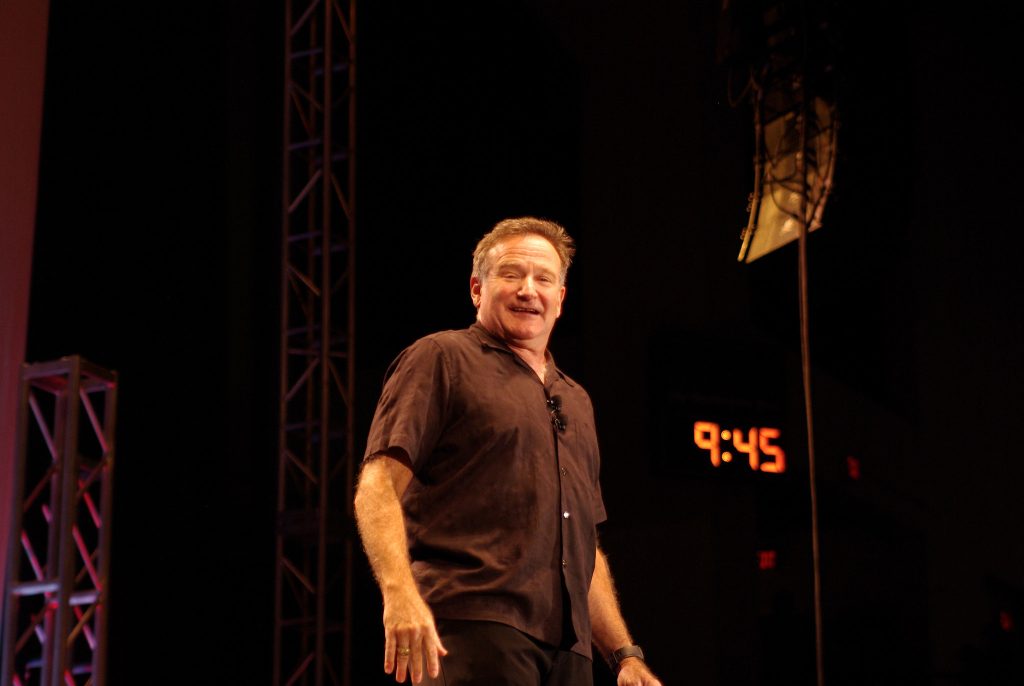
Few comedians have ever matched the speed, heart, and sheer unpredictability of Robin Williams. Whether he was on stage, on screen, or simply in an interview, Williams was a whirlwind of energy and emotion. Widely considered one of the best improv comedy legends, he blended lightning-fast wit with emotional depth that made him truly unforgettable.
What made Robin Williams such a unique comedian?
Robin Williams didn’t tell jokes—he channeled characters, shifted voices, and spun spontaneous narratives at a pace most minds couldn’t keep up with. His stand-up shows were like watching a human fireworks display—explosive, dazzling, and full of surprise.
What set him apart was his rare ability to be both deeply silly and incredibly wise. One moment he’d be riffing in a dozen accents, the next he’d sneak in a profound observation about life, love, or the absurdity of existence.
Unlike most comics who build setups and punchlines, Robin danced in the moment, often making it up as he went—yet somehow it always landed.
The Manic Genius: Deconstructing Robin Williams’ Comedic Style
Robin Williams was one of the most famous physical comedy actors and legends, and for good reason. His entire body was a comedic instrument—from wild gestures to exaggerated expressions to lightning-quick movement.
- His improvisation was legendary, often so fast even fellow performers couldn’t keep up.
- He could switch between five characters in a single sentence without missing a beat.
- Also mixed childlike wonder with sharp, adult satire in a style entirely his own.
Whether he was doing stand-up, hosting award shows, or just being interviewed, you never knew what was coming—and that unpredictability was part of the magic.
“You’re only given a little spark of madness. You mustn’t lose it.” — Robin Williams
And he never did.
From Mork to Genie: Robin Williams’ Most Iconic Roles
Of course, Robin’s comedy extended far beyond the mic. He lit up screens in some of the most beloved roles in entertainment history:
- Mork from Mork & Mindy, the alien who introduced his zany brilliance to millions.
- The Genie in Aladdin, where his improv-heavy voice work changed animation forever.
- Mrs. Doubtfire, one of his most iconic performances that blended disguise, heart, and slapstick.
Even in dramatic roles like Good Will Hunting, his comedy always found a way to shine through.
Each performance felt personal—as if he was speaking directly to the audience, telling us, “It’s okay to laugh, even when life is messy.”
Robin Williams wasn’t just funny—he was transformative. He didn’t fit into comedy. He bent it around him.
And though he left us too soon, his voice, his energy, and his fearless joy still echo in every stage, screen, and laugh he touched.
2. George Carlin: The Counter-Culture Philosopher of Comedy
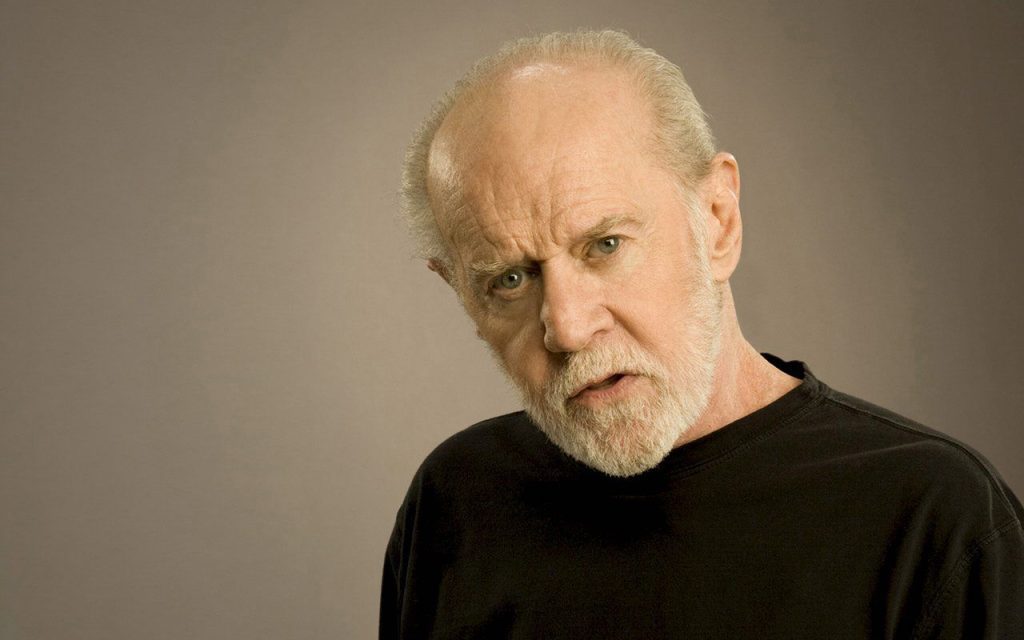
If comedy had a philosopher-king, it was George Carlin. Known for his razor-sharp insight, rebellious streak, and unmatched command of language, Carlin is undoubtedly among the top most influential comedians ever. He didn’t just make people laugh — he made them think, often questioning everything from religion to politics to the English language itself.
Social Impact of George Carlin’s Comedy Routines
From the start, Carlin wasn’t in it just for the funny jokes — although he delivered plenty of those. His routines struck a deeper chord. He tapped into the cultural and political turbulence of his times, speaking directly to audiences who felt disillusioned by authority and confused by social norms.
Over time, his comedy evolved into something much more than entertainment. It became social commentary, delivered with a smirk and a punch.
- He criticized hypocrisy in government and religion.
- Exposed the absurdity in everyday life.
- Challenged taboos and dared people to confront uncomfortable truths.
Thanks to his fearless voice, Carlin’s work continues to be studied in universities and quoted in protests — and it still packs a punch.
Deconstructing Society: The Intellectual Humor of George Carlin
What made Carlin’s humor so uniquely powerful was his intellectual approach. His jokes were often built like essays — with arguments, evidence, and razor-sharp conclusions — all delivered with impeccable timing and deadpan delivery.
He loved to play with words, diving into:
- Contradictions of the English language
- Fine print in everyday life
- Strange behaviors of modern society
Carlin’s style wasn’t chaotic. It was precise, crafted, and incredibly well-informed. You laughed, and then you realized you’d just learned something too.
That rare mix of wit, wisdom, and witlessness made his routines not only hilarious but deeply lasting.
“The Seven Words”: How George Carlin Changed Free Speech
Perhaps Carlin’s most famous legacy is his infamous “Seven Words You Can Never Say on Television” routine. At first glance, it was just a bit about censorship and profanity. But when the routine led to a real-life Supreme Court case, it became something bigger: a defining moment in the fight for free speech in entertainment.
- The bit was banned from broadcast.
- Resulting court case changed how the FCC regulated speech on radio and television.
- Carlin became a symbol of artistic freedom and First Amendment rights.
This wasn’t just comedy — it was history.
“I think it’s the duty of the comedian to find out where the line is drawn and cross it deliberately.” — George Carlin
He crossed the line again and again, and audiences thanked him for it.
In the end, George Carlin didn’t just tell jokes — he redefined what a comedian could be. He was equal parts stand-up comic, poet, activist, and truth-teller. And though he’s gone, his words still feel urgently relevant — maybe now more than ever.
1. Richard Pryor: The Revolutionary Who Changed Comedy Forever
When people ask, “Who is the greatest stand-up comedian of all time?”, one name rises above all others — Richard Pryor. Universally acknowledged as one of the funniest stand-up comedians of all time, Pryor didn’t just make people laugh — he made them see the world differently. With a mic in his hand, he didn’t tell jokes so much as live them, in real time, with raw honesty and an open wound.
For comedians, he wasn’t just an inspiration, he was the blueprint. His influence shaped everyone from Chris Rock and Dave Chappelle to Kevin Hart and beyond. If you trace the roots of modern stand-up, all roads lead back to Pryor.
How Richard Pryor Changed Stand-Up Comedy Forever
Before Richard Pryor, stand-up was mostly polished, light, and often impersonal. Then he came along and blew it all wide open. Turned the stage into a confessional booth, a therapist’s couch, and a battleground — often all in the same set.
He was among the true pioneers of confessional style stand-up comedy, talking candidly about race, addiction, sex, poverty, and his own near-fatal mistakes. He didn’t gloss over pain, he transformed it into art. Pryor dared to bring his entire flawed, brilliant, broken self to the stage. Audiences didn’t just laugh, they leaned in, connected and related.
That vulnerability, paired with his fearless critique of society, made him one of the most groundbreaking comedians who changed the industry forever.
The Raw Honesty and Unmatched Storytelling of Richard Pryor
At his core, Pryor was a master storyteller. His characters came alive — voices, mannerisms, even emotions. He’d shift from a junkie on the street to a drunk in a bar to his own childhood self within seconds. Every tale felt like you were there beside him, living it, feeling every emotion.
His genius was in the delivery. He could take a moment of heartbreak or humiliation and spin it into comedy gold. His infamous “freebasing accident” bit — describing how he set himself on fire — is a jaw-dropping example. Only Pryor could take such a horrifying event and turn it into something brutally funny and deeply human.
That level of vulnerability had never been seen on stage before, especially from a Black performer in 1970s America. And yet, he made it the norm because it was true. That’s why his work endures.
Why Richard Pryor is Considered the G.O.A.T. of Stand-Up
There are many comics who are great. A few who are legends. But when it comes to the G.O.A.T. of stand-up, most roads lead straight to Richard Pryor.
He wasn’t just funny — he was revolutionary. Pryor was a truth-teller, a cultural mirror, and one of the masters of political satire comedy before the term was even mainstream. And he did it with no apologies. No filters. Just the truth, the whole truth, and the uncomfortable, hilarious, unforgettable truth.
He won Emmys, Grammys, and hearts — but his greatest reward was the new standard he set for comedy: honest, personal, fearless.
Richard Pryor didn’t just change comedy. He changed what we thought comedy could be…..and that’s why, all these years later, he’s still the king.
Honorable Mentions: Comedy Giants Who Nearly Made the List
Narrowing down the funniest people ever is no easy task and for every name on this list, there are several more who left an unforgettable mark on comedy. These legends may not be in the top ten, but they could easily have been.
Jerry Seinfeld perfected observational humor with his razor-sharp takes on the mundane, becoming a sitcom icon and a stand-up purist.
Chris Rock brought a brilliant mix of political commentary, streetwise honesty, and hard-hitting punchlines, redefining stand-up for a new generation.
Phyllis Diller, one of the first female stand-up comics to go mainstream, broke barriers with her eccentric stage persona and fearless delivery.
Lenny Bruce pushed comedy into dangerous, uncensored territory, setting the stage for future generations of truth-telling comics.
Mel Brooks, the king of satire, delivered some of the funniest and most quotable films of all time, blending slapstick, parody, and biting social commentary.
These comedy icons helped shape the world of humor in their own right and in many ways, they continue to influence the voices we laugh at today.
The Final Thought:
What connects all these comedy legends, from Gilda Radner to Richard Pryor isn’t just talent. It’s fearlessness. It’s the willingness to take risks, to push boundaries, and to say the things no one else dared to say. These performers didn’t just chase laughs — they used humor as a way to reveal truth, challenge norms, and shine a light on the human condition.
Each of them was a trailblazer, using their unique voice to reshape what comedy could be, whether through character work, raw storytelling, sharp satire, or physical brilliance. But more than anything, they knew how to connect. Across generations, backgrounds, and borders, their work reminded us that laughter is one of the few things that truly unites us all.
Comedy matters because it heals. It disarms. It tells the truth when the truth is hard to hear. And in a world that often feels overwhelming, it reminds us to laugh, not because things are perfect, but because we’re still here.
These legends didn’t just make the world laugh — they made it a better, braver, and more honest place.
Who Did We Miss?
Now it’s your turn. Who would be on your personal Mount Rushmore of comedy?
Did we leave out a legend you can’t believe didn’t make the cut?
Let us know in the comments below! We’d love to hear who makes you laugh the hardest — whether it’s a classic icon, a modern favorite, or someone who changed the game in your eyes.
Because in the end, the beauty of comedy is that it’s personal — but laughter? That’s universal.

